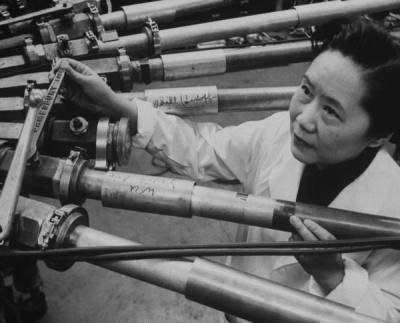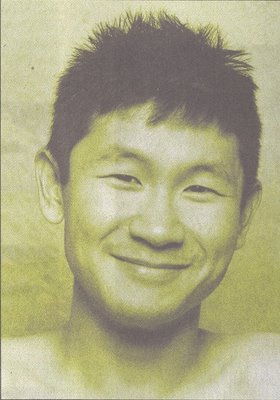I'm dedicating this post to Chien-Shiung Wu (aka Wu Jianxiong), a Chinese/American nuclear physicist who worked on the Manhattan Project and the first female President of the American Physical Society.

Her 1965 book, "Beta Decay", is still a standard reference for physicists. Oh, and she was a prof at Columbia, too.
Someone called Lara Eads has set up a very readable biography of Chien over here - much more fun to read than the Wikipedia article.
Among the intriguing facts:
"During her years at high school, and later on during college years, Wu was the leader of the national student underground. The underground was the Chinese voice of nationalism. She was recruited because she had the highest grades in school, so the other students figured she would never get expelled. Plus, her dad was a former revolutionary during the Manchu dynasty, so he could be counted on to support her activities (McGrayne, p. 259)."

"Many believed that Wu’s beta decay work was good enough to win her a Nobel Prize, but it did not fit the rules of the award, because she did not technically discover something. As one of her former students and the later dean of Rutgers University put it, “She had straightened up a big mess in physics quite elegantly, but it wasn’t quite a discovery” (McGrayne, p. 268-269)."
"In 1956 two other Chinese-born physicists, Chen Ning Yang and Tsung Dao Lee, came to Wu for help finding out if an idea of theirs was right. They had suggested that the law of parity, a belief that physical reactions would be the same whether particles involved in them were “right handed” or “left handed”, would not hold true in interactions of weak nuclear decay (Yount, p. 216).
To do this experiment with 1950 technology was difficult. The National Bureau of Standards in Washington, D.C. had one of the few laboratories that could cool material to an absolute zero, which was necessary for the experiment, so this is where Wu would conduct the experiment. For the next several months, she averaged four hours of sleep a night, going back and forth between classes at Columbia and Washington. But, after nine months, it was all worth it when Wu and the rest of the research team were able to announce that they had disproved the law of parity (McGrayne, p. 274-276). (see law of parity sub page)
Ten months later Yang and Lee won the 1957 Nobel Prize for physics. Wu was not included, because Yang and Lee had originated the theory (McGrayne, p. 277)."
Next year maybe I should talk about Assoc Prof Ong Soh Khim, the first Singaporean engineer to receive an Emerging Leader Award in Academia from the US-based Society of Women Engineers (SWE). Unfortunately, her Wikipedia page mostly talks about how she used the word "shit" in Parliament while serving as an NMP.


No comments:
Post a Comment